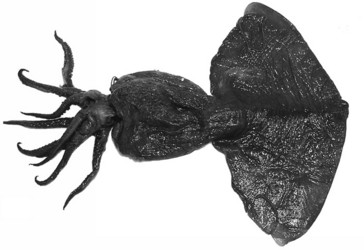Onychoteuthis mollis
K.S.R. BolstadIntroduction
Many authors (e.g., Arkhipkin & Nigmatullin 1997) consider Os. mollis (the holotype of which is the sole known specimen) a junior synonym of Os. banksii. Bolstad (2010) considered it distinct based on proportions of the gladius, which do not match those of any other known Onychoteuthis species. However, Onychoteuthis specimens from the Mediterranean are scarce in collections, and additional material is needed to confirm the status of Os. mollis.
Characteristics
- Photophores
- Two circular intestinal photophores present. Anterior photophore ~50% diameter of posterior photophore.
- Ocular photophore a long whitish patch on ventral surface of each eyeball.
- Measurements of holotype
- Mantle length - 153 mm
- Arm lengths - 46-63 mm
- Fin length - 84 mm
- Fin width - 151 mm
- Tentacles - reduced to short stumps
- Gladius
- Narrow, greatest width ~4% GL.
- Free rachis extremely long, ~40% GL.
Comments
From Bolstad (2010): 'Each species of Onychoteuthis likely degenerates into a gelatinous state near the end of its lifespan, and Os. mollis may ultimately prove synonymous with an older species. However, the peculiar gladius of the Os. mollis holotype (free rachis ~40% GL, compared with 18–30% in all other taxa [...]) prevents its synonymy with any other known species of Onychoteuthis at present, including Os. banksii (sensu stricto). Toll (1982) noted that the relative length of the free rachis changes ontogenetically in some species, so the gladius proportions of this holotype may appear less unique in the context of additional material. However, Toll found that the free rachis length index (FRLI) commonly decreases with age; the Os. mollis holotype would have undergone the opposite growth pattern, if its high FRLI had developed with maturity.'
- Narrow, greatest width ~4% GL.
References
Appellöf, A. 1891. Teuthologische Beiträge II: Chaunoteuthis n.g. Oegopsidarium. Bergens Museums Årsberetning, 1891: 29 pp.
Arkhipkin, A.I. & Nigmatullin, C.M. 1997. Ecology of the oceanic squid Onychoteuthis banksii and the relationship between the genera Onychoteuthis and Chaunoteuthis (Cephalopoda: Onychoteuthidae). Journal of the Marine Biological Association of the United Kingdom, 77: 839–869.
Bolstad, K.S.R. 2010. Systematics of the Onychoteuthidae Gray, 1847 (Cephalopoda: Oegopsida). Zootaxa, 2696: 186 pp.
Toll, R.B. 1982. The comparative morphology of the gladius in the Order Teuthoidea (Mollusca: Cephalopoda) in relation to systematics and phylogeny. Dissertation (PhD), University of Miami, 390 pp.
Title Illustrations

| Scientific Name | Onychoteuthis mollis |
|---|---|
| Location | Mediterranean |
| Specimen Condition | Dead Specimen |
| Sex | Female |
| Life Cycle Stage | Spent |
| View | Dorsal |
| Size | ML 153 mm |
| Collection | ZMBN |
| Type | Holotype |
| Collector | Lampe |
| Copyright |
© K.S.R. Bolstad

|
About This Page
K.S.R. Bolstad

Auckland University of Technology
Correspondence regarding this page should be directed to K.S.R. Bolstad at
Page copyright © 2019 K.S.R. Bolstad
All Rights Reserved.
- First online 23 December 2010
- Content changed 11 October 2015
Citing this page:
Bolstad, K.S.R. 2015. Onychoteuthis mollis . Version 11 October 2015 (under construction). http://tolweb.org/Onychoteuthis_mollis/145220/2015.10.11 in The Tree of Life Web Project, http://tolweb.org/









 Go to quick links
Go to quick search
Go to navigation for this section of the ToL site
Go to detailed links for the ToL site
Go to quick links
Go to quick search
Go to navigation for this section of the ToL site
Go to detailed links for the ToL site